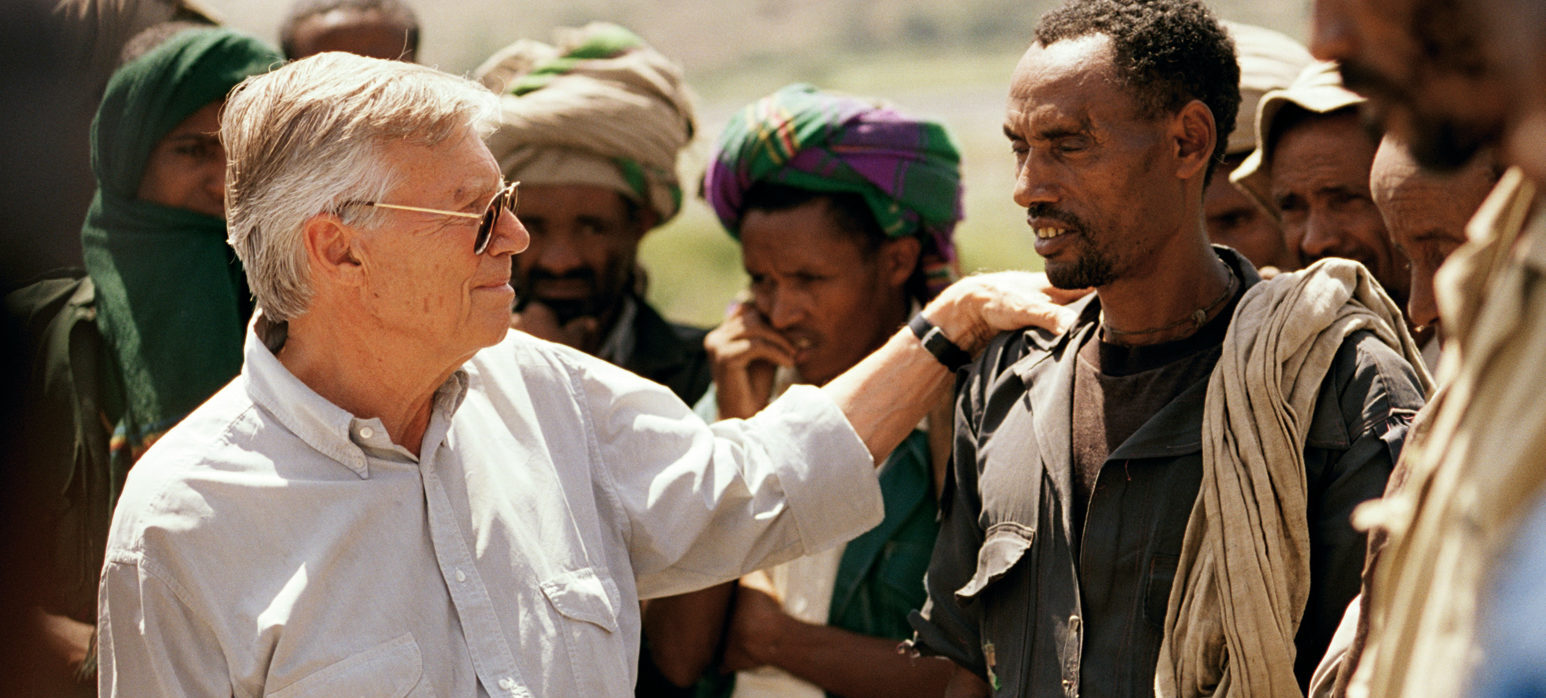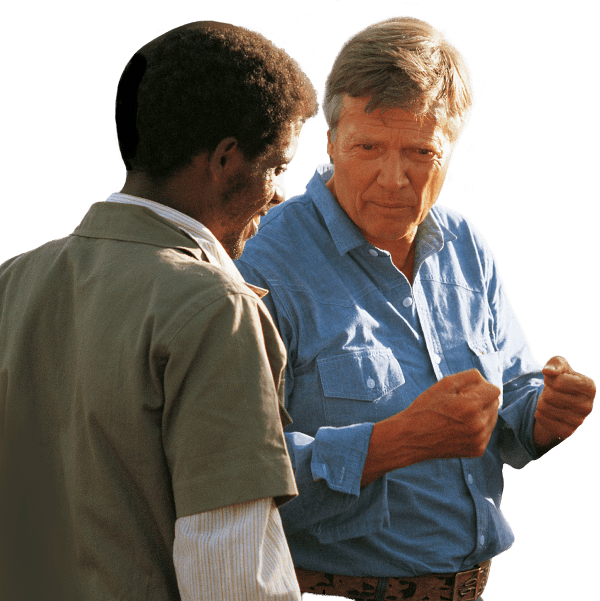
Our basis
As partner. Sustainable. At eye level.
Founding by Karlheinz Böhm
Menschen für Menschen was founded in 1981 by celebrated actor Karlheinz Böhm (of “Sissi” movies fame). Appalled by reports on the catastrophic famine in the Sahel zone, he decided to use his popularity to help. His legendary wager in the ZDF TV show “Wetten dass..?” generated 1.2 million German Marks for the people of Africa. Since then, our organisation has been committed to achieving a sustainable improvement in the living conditions of the people in rural Ethiopia, and is campaigning for a cooperative partnership in the one world. In doing so, we place great emphasis on political and ideological neutrality.
“Anger is the main motivation for my work – anger about the injustice between rich and poor.”
“

Today Menschen für Menschen is represented by organisations in Germany, Austria und Belgium. Our office in Addis Ababa, managed by Menschen für Menschen Germany, coordinates the project work on site, and implements it on behalf of all country organisations. Our work is jointly funded by all European organisations.
Our vision
Our vision is a world in which we live sustainably in a just society; a world in which there is equal opportunity and every person has the chance to lead a self-determined life on their own merits.
Our mission
We are committed to promoting equal opportunities and sustainable development through collaborative action across countries and continents to overcome social injustice and improve the living conditions for current and future generations.
Our approach
Our work is based on the empowerment of individuals and communities, solidarity in action and creative innovation. Our coordinated projects and measures in all key areas of life are geared to people’s needs. We implement them decisively together with the population and our local teams. In doing so, we build on personal responsibility and solutions that demonstrably improve people’s lives in the long term. Our actions are based on the sustainable use of natural resources.
Integrated sustainable development
Because the problems in the remote areas of Ethiopia are closely interrelated, it seldom makes sense to tackle deficits in isolation from one another. For this reason we operate according to the principle of integrated sustainable development. Together with the local population we determine the measures necessary for sustainable development in five focal areas in selected project regions and link them together to form an overall strategy.
Food security through improved methods of cultivation and animal husbandry, together with terracing and afforestation measures to combat soil erosion.
Hand dug wells and spring developments to supply the population with clean drinking water, awareness-raising for better hygiene.
Construction of schools, provision of training facilities in vocational schools (TVETs) and literacy courses.
Equipment of health centres to improve the standard of medical care, training of nursing staff and organization of awareness-raising campaign.
Promotion of small-scale enterprise to combat poverty, microcredits and education to improve the social standing of women; development of infrastructure for better access to markets.
The same rules apply to all our activities: they must be well-founded and conceived for the long term, enabling them to be continued after our withdrawal. For this reason, we enlist the support of the local population in our projects at an early stage, and place great emphasis on participation and dialogue at eye level. Upon completion, infrastructure facilities are handed over to the local community, thus avoiding external dependencies.
Sustainable Development Goals
In 2015 the United Nations agreed on 17 Sustainable Development Goals (SDGs) for the purpose of ensuring long-term development on an economic, social and ecological level. These goals were directed not only to developing and emerging countries, but also to industrial nations and called for concerted action by governments, civil society and businesses. Since 1981 Menschen für Menschen has successfully implemented 13 of the SDGs in Ethiopia and has thus contributed to achieving a balanced global community.
Our working practices in Ethiopia

Around 530 well-trained Ethiopian employees work for us in the project areas. They are familiar with local conditions and speak the local language. That creates trust and promotes direct exchange with the inhabitants who are to benefit from our projects. We prefer to use our own employees because this is more effective, cheaper and more sustainable for us in the long term than calling in outside regional organizations.
With our integrated approach in project work, involvement of local people and long-term commitment we achieve a sustainable improvement in living conditions.
In order to achieve as much as possible with limited means, Menschen für Menschen plans each project with the greatest of care. The starting point is always specific local needs, which are determined in exchange with the local population.

After handing over a project to the community and local administration we remain available for advice and support.
Our employees pay regular visits to former project areas. We perform regular follow ups in the form of systematic monitoring and evaluation. This enables us to constantly improve our performance and ensure the long-term success of our projects.

A partnership calls for fairness. That also applies to the use of day labourers.
Since 2014, all construction companies who build schools for us in Ethiopia are obliged by contract to pay a fair minimum wage to temporary workers, irrespective of sex. In addition, protective gear – such as helmets and gloves – must be provided for tasks involving special risks.

In its project work Menschen für Menschen attaches the utmost importance to transparency and efficiency. For each implementation phase we specify the scope of the project, goals, measures and responsibilities. At the same time we regularly review our approaches and processes in the course of project management and optimise them accordingly.
To ensure that the donations yield the greatest possible benefits, the course of each project is systematically documented and the deployment of personnel and project funds is subject to ongoing checks. The project management is partly responsible for this, together with the monitoring supervisors in the regions, who plan all measures in detail and appoint specialists to oversee them. The responsibility also lies with the experts at our Coordination Office (PCO) in Addis Ababa. The latter submits an annual report containing a detailed summary of each project to the Foundation’s Executive Board.
In 2012 we installed a comprehensive impact monitoring system for project planning and implementation. A full-time monitoring and evaluation coordinator at the PCO in Addis Ababa was appointed for the purpose, together with seven monitoring and evaluation supervisors in the project regions.
Impact monitoring systematically reviews the effects of our activities. It allows conclusions to be drawn on the project work and enables ongoing adjustment and improvement of projects. The monitoring system itself is likewise subject to constant optimization.

The evaluations of Menschen für Menschen are carried out by external appraisers and are always an assessment of project work. The results are incorporated in the programme planning and thus serve the continuous development of the aid programmes.

Each of our integrated development projects runs in six stages over a period of nine to 15 years.











